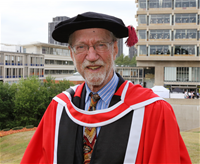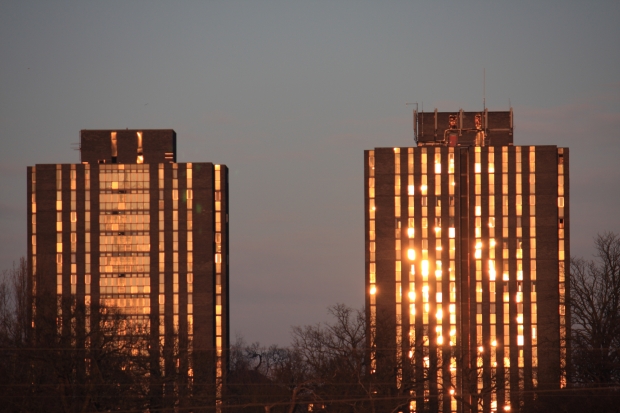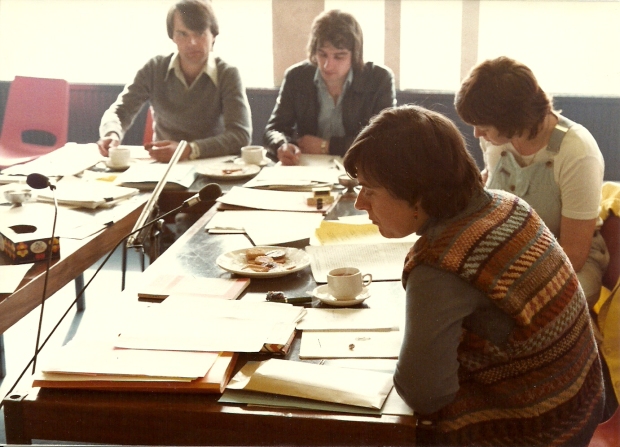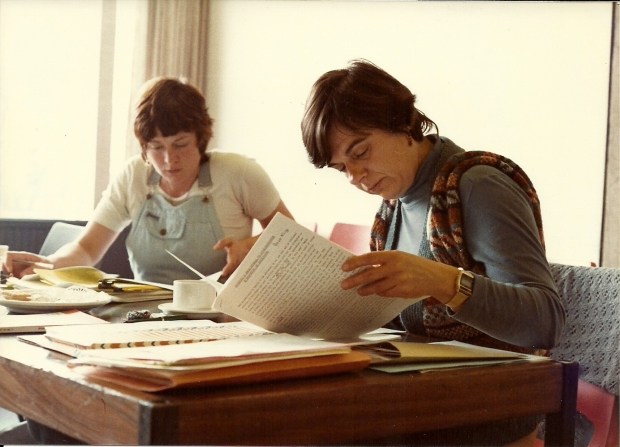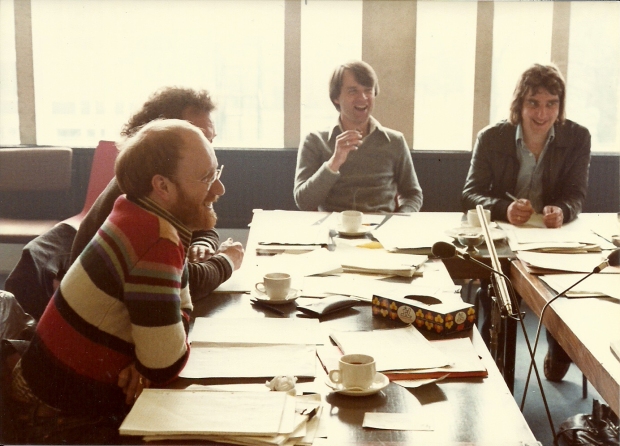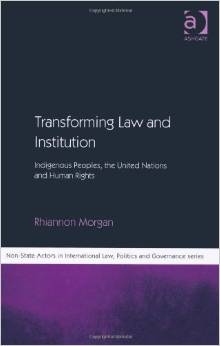Iain Sandison
Posted by stories of essex sociology in Uncategorized on January 28, 2016
Iain arrived in the Department of Sociology at Essex in October 23rd. He was a mature student researching Crime and Addiction for his Ph.D. During his time in the Sociology Department be became a highly involved and much loved student. His sad death in March 2008 came as a great shock.
Kenny Monrose writes:
Iain Sanderson was the first person who approached and spoke to me on the day I enrolled in the department. I remember it because it was like the first day at school in many ways – emotions and anxieties ran amok for the newness and anticipation of the exciting things to come. He greeted me with a firm handshake but no smile. In time I realized that Iain wasn’t one for smiling, in fact I don’t think I ever recall him smiling, but that didn’t matter. What you did get from him though in abundance was sincerity and real sense of genuineness – a rare trait in academia, but I digress. Iain’s life was a real tapestry from reaching the ‘heights’ of being an international banker, to hawking the Big Issue on the cobbles, Iain had been there and done it, and didn’t gas about it. As well as being ex military, a banker, a poet, writer and advocate of home baking, to me he was a friend and someone whom I believe the students who he taught had bundles of respect for.
Like me at the time, Iain lived in Newham on the site earmarked for demolition to make way for the 2012 London Olympics, and made bare his sentiments regarding what this upheaval would cause to the community he cherished. As a result he acted tirelessly as a representative for the Clays Lane housing co-operative, in order to aid what was an already deprived and abandoned enclave of London.
I still remember our last meaningful conversation in the Guinness trust flats he was forced to move to in Sloane Square Knightsbridge, where he wasn’t at all happy living and considered it soulless and inexpressive. I was crushed visiting Iain in the Charing Cross hospital and finding him unable to speak, however his eyes knew I was there. Over time the pain eased, knowing that he was truly a beautiful soul who gave encouragement to the powerless, and cared about the welfare of others. I hope the previous talk of extracts from his uncompleted PhD thesis to be published can be revisited.
Kenny Monrose
A tree was planted in Iain’s memory in the university grounds in May 2008. A few of the photos taken at the memorial event are included here. The names of those present are given below.
Mike Roper
Dianne Blundell
Robin West
Rachel Frost
Carlos Gigoux
Colin Samson
Eamonn Carrabine
Rob Stones
Jackie Turton
Kenni Monrose
Liz Day nee Carter
Andreas Pollman
Sue Aylott
Mihoko Fukushima
Michele Lamb
Nigel South
Jane Brown (now deceased)
Bethany Morgan
Michelle Hall
Megan Ward
Daniel Nehring
Sheila Marrinan
Dave Sayers
Hannah Mason-Bish
Alexa Gordon
David Bruce Curtis (1974-1977)
Posted by stories of essex sociology in Uncategorized on November 19, 2015
I am living in Denmark, and have been since December 2000. I work as a social pædagog – working in a large institution with mentally and physically disabled adults. Full time and paid. I qualified here in Denmark.
My interests many: history/sociology, particularly military history, sociology of power and deviance. Philosophy – particularly existentialism. I love music and play the piano … badly. I draw and paint.
My time at Essex left me with a passion for certain academic fields, as named above. I admit that my overall ‘world view’ has changed a lot since those days, but Essex gave me the tools.
New Honorary Degrees
Posted by stories of essex sociology in Alumni, Around the world, Former staff, Uncategorized on August 19, 2015
Two former Essex people were awarded Honorary Degrees at this year’s Graduation Ceremonies
Paul Thompson is a world pioneering oral historian and was a founder appointment in the sociology department in September 1964. He has been associated with the department for the past fifty years!
Andrew Mack was an early Sociology/ Government student at Essex. He helped revolutionise the field of peace research, making important contributions to the work of the United Nations and working at leading universities around the world.
He is currently Director of the Human Security Report Project at Simon Fraser University in Canada and a faculty member of the university’s new School for International Studies. Prior to this he directed the Human Security Centre at the University of British Columbia. Before this, Professor Mack was a Visiting Professor at the Program on Humanitarian Policy and Conflict Research at Harvard University.
Professor Andrew Mack is an Essex alumnus who helped revolutionise the field of peace research, making important contributions to the work of the United Nations and working at leading universities around the world.School for International Studies. Prior to this he directed the Human Security Centre at the University of British Columbia. Before this, Professor Mack was a Visiting Professor at the Program on Humanitarian Policy and Conflict Research at Harvard University.
Hear what they have to say on the University/ Department Facebook Page
Click here:
https://www.facebook.com/UoESociology
Sociology Department’s 50th Anniversary Conference: 24th June, 2015 PROGRAMME
Posted by stories of essex sociology in Alumni, Former staff, History on June 15, 2015
Sociology Department’s 50th Anniversary Conference:
24th June, 2015 Programme
NEW DIALOGUES AND DIRECTIONS
Ivor Crewe Auditorium
9.15-9.50 Registration and Refreshments
9.50-10.00 Conference Introduction (Nigel South)
10.00-12.30 Past Excitements New Dialogues
A panel of distinguished members of the Department reflect on what was thought to be most exciting about Sociology in the past (both as a discipline and in the way[s] in which it was practiced at Essex) – and how all this has been reflected in their own ideas and research – as well as in ‘new dialogues and directions’ today (Ted Benton; Joan Busfield; Diane Elson; Ken Plummer; John Scott; and Paul Thompson)
10.00-11.15:
Chair: Lydia Morris
-Paul Thomson ‘Discovering life stories from first fumbles to our own Pioneers of Social Research’ (30 min)
-Joan Busfield ‘Continuities and Changes in British Sociology’. (15 min)
-Ted Benton ‘Beyond nature/society dualisms (15 min)
Questions (15 min)
11.15-11.30 Break
11.30-12.30:
Chair: Michael Roper
-Ken Plummer ‘Dialogues of Hope for a Better World’ (15 min)
-John Scott ‘Stratification and Social Theory: Retrospect and Prospect’ (15 min)
-Diane Elson ‘Challenges to Women’s Rights in a Time of ‘Austerity”? (15 min)
Questions (15 min)
12.30-14.00 Lunch break
14.00-16.000 Future Challenges New Directions
In three parallel, thematic sessions, colleagues who have joined the Department in more recent years will reflect on the interesting/challenging issues facing Sociology in the 21st century
Room 5S.3.8 Challenging Questions in Social Theory
Chair: Sean Nixon
-Michael Halewood, “Rethinking the Social” (20 min)
-Linsey McGoey, “Theorizing Excess” (20 min)
-Sandya Hewamanne, “Affect, Human Genome, and Dogs and Monkeys” (20 min)
PhD Discussant: Ms Stephanie Nitsche 5 mins
15 minutes question time
Following the session please re-convene at the Ivor Crewe Auditorium
Room 5S.4.9 Civic Challenges, Community Studies and Public Sociology
Chair: Jackie Turton
-Michael Bailey, “Whither Community Studies? Return to Ecclesfield” (20 min)
-Neli Demireva and Isabel Crowhurst, “The Impact of Sociological Research on Social Policy” (20 min)
-Robin West, “Environment: Moral Selves and Civic Responsibilities” (20 min)
PhD Discussant: Ms Sarah Day 5 mins
15 minutes question time
Following the session please re-convene at the Ivor Crewe Auditorium
Room 5N.4.6 New Terrains
Chair: Andrew Canessa
-James Allen-Robertson, ‘Gameplay Capitalism and the Hacker Ethic’. (20 min)
-Darren Thiel, “Countering Austerity and the Logic of Welfare Reform” (20 min)
-Pete Fussey, “Topologies of Urban Security and Surveillance in the Post-Snowden Era” (20 min)
PhD Discussant: Ms Roxana Baltaru 5 mins
15 minutes question time
Following the session please re-convene at the Ivor Crewe Auditorium
16.00-17.00 Ivor Crewe Auditorium
Closing Comments (Sean Nixon)
and Drinks.
The 50th Anniversary Conference of the Department of Sociology
Posted by stories of essex sociology in Alumni, Former staff on May 10, 2015
The 50th Anniversary Conference of the Department of Sociology
Wednesday 24th June, 2015
Ivor Crewe Hall, 9.30 start.
The Essex Sociology Department has helped to shape sociological thought and practice across Britain and around the world. In our 50th year, a panel of distinguished former and current members offer their own critical reflection on this contribution.
In the morning, we discuss its legacies and the new dialogues it continues to foster (Ted Benton, Joan Busfield, Diane Elson, Ken Plummer, John Scott and Paul Thompson).
In the afternoon, there will be three thematic sessions (social theory, civic challenges and new terrains) that will explore some of the Department’s contemporary research challenges and collaborations. These include: theorizing excess, moral selfhood, hacker ethics, countering austerity and urban security (Michael Halewood, Linsey McGoey, Sandya Hewamanne, Michael Bailey, Neli Demireva, Isabel Crowhurst, Robin West, James Allen- Robertson, Darren Thiel, Pete Fussey).
ALL WELCOME
For further details and to reserve your place please contact Agnes Skamballis on askamb@essex.ac.uk
Jennifer Bullen MA 2006, Ph D 2010
Posted by stories of essex sociology in Alumni, Obituaries on April 3, 2015
Eamonn Carrabine writes:
I would like to say a few words as Jen’s death touched many of us…she was a familiar figure around the department, having begun to study here in 2005 taking the MA in Sociological Research and then going on to complete her PhD in 2010…She also worked as a GTA in the department, and was much liked by her fellow teachers and students. In addition to this, she also worked closely with Jackie Turton as a researcher interviewing inmates at Bullwood Hall prison about their life stories. These interviews were filmed and then edited to be used in training for prison staff. She also worked with Dick Hobbs as a researcher on one of his projects looking at the Champions League. This breadth of experience is unusual for a PhD student, but I think gives a sense of how much faith we had in her abilities. I have many memories of Jen, but I want to share two.
The first is when I first met her. This was just after she had been awarded the ESRC funding to come and study here. The project was meant to be on I think, a social history of female football fans, but it was clear she was not really interested in that topic and instead she wanted to change focus and concentrate on the then new phenomenon of WAGs. Footballers Wives and Girlfriends. So from the beginning I knew she was someone who had a very strong view about what they wanted to do in their research, and who was determined to achieve all that she set out to do. And for me that quickly became one of her defining features, a very determined mind set mixed with a quiet enthusiasm for whatever task was at hand.
The second memory is when I was at home one early evening, several years later, and Radio 5 was on in the background as I was making the dinner. I heard one of the presenters saying they were now going to go live to the British Sociological Association conference, where they were going to interview someone who was researching WAGs. The interviewer was Pete Allen, and for those of you who know the station, know he can be difficult, and I knew he was going to be highly sceptical of academics doing research on this kind of thing. But, I have to say I was absolutely blown away by how well Jen handled the interview, giving measured, thoughtful and calm answers to what were pretty hostile questions. It was a very impressive and assured performance, giving listeners some much needed sociological insight into how the media themselves represent WAGs.
It was one of those moments when I felt that Jen was the kind of student that the Department should feel very proud to have given an intellectual home to for over five years…and I think for much of that time she was very happy here, making some very close friends along the way and I think this tree will be one way in which her memory will live on in Essex.
Eamonn Carrabine
The Queer/ Gay/ Sexualities Research Tradition at Essex
Posted by stories of essex sociology in Books, Former staff on April 3, 2015
One of the many fields of research in the Essex Sociology Department has been ‘sexualities’. In the 1990’s it established the journal Sexualities and in the 00’s it set up the Centre for Intimate and Sexual Citizenship run by Róisín Ryan Flood. To celebrate the 50th anniversary, a seminar was held in March 2015 to look at some of its earliest work that helped to create a new field of study – lesbian and gay studies, queer studies and critical sexualities studies – and to consider just how far it has advanced.
In the 1970’s there was almost no research in these areas and Essex was one of the pioneers. Mary McIntosh’s The Homosexual Role – which argued that homosexuality was not a universal condition but a variable social role- is often seen as a foundational text. The seminar was held in her memory, discussed her work and highlighted the earliest collective work produced in the department during the 1970’s and published in 1981 as The Making of the Modern Homosexual. This book brought together students and staff, and suggested new directions for research. Most notably it developed a historical sense of same-sex relations; linked it firmly to power, gender and identity; and developed the debate over constructionism and essentialism. While they were innovative then, many now would take these early paradigm shifts for granted as a new vibrant field of ‘sexualities studies’ has emerged over the past twenty years, moved on and developed new concerns.
The book The Making of the Modern Homosexual was organized into three parts. The first part reprinted the McIntosh article and Mary then discussed its value in an interview with Jeffrey Weeks and Ken Plummer. It suggested key features of new emerging frameworks. The second part took up three key themes: Ken Plummer suggested the fruitfulness of applying stigma theory, labeling theory and ideas of ‘oppression’ to homosexuality; Jeffrey Weeks puzzled the historiography of homosexuality and its latent essentialism; while Annabel Faraday critiqued the apparent males bias of existing ‘male’ ‘gay’ research and suggested new radical feminist baselines. The third part then provided three empirical studies being conducted by graduate students – a first (John Marshall) traced the emergence of the category from the late 19th century to the 50’s; a second (Dave King) looked at the making of ‘trans’ categories; and a third (Gregg Blachford) looked at the growing significance of ‘masculinity’ in the gay culture. Some of these contributors will be returning for the seminar and meeting again for the first time in over thirty years!
The session was very lively. Gregg Blachford had flown in from Canada to chair the session and John Marshall – who left to become editor of Gay News and gay Times for much of the 1980’a – returned to Essex for the first time in over thirty years. Annabel Faraday sent a message saying she had left academia for the world of ceramics and wished the seminar well. Dave King has now retired to a Welsh village where he participates in the local community shop.
The world has moved on. When Essex was established ‘homosexuality’ was still a crime and firmly defined as sickness. The Gay, Lesbian and Women’s movement had not happened and AIDS had not arrived. Over the years there have been major changes and now the university has strong policies on supporting gay, gender and transgender equality rights. The seminar ended by asking just how much has things really changed? Not as much as it looks on the surface – especially if the global stage is considered.
Here are a few photos taken at a seminar in 1980 as the authors discussed their papers.
Rhiannon Morgan (1974-2014) M.A, Ph.D.
Posted by stories of essex sociology in Alumni, Books, Obituaries, Roll Call on March 26, 2015
It is with great sadness that we heard of the death of Rhiannon Morgan, aged 40, on 26th October 2014. Rhiannon came to Essex in 1999 to study the MA in Human Rights and then moved to Sociology to pursue her PhD on the global indigenous movement, which she completed in 2004. During her time in the department Rhiannon was not only a dedicated and outstanding scholar. She was also a very active, sociable member of the PhD community, and an enthusiast for the staff-student football matches that thrived at this time. On completing her PhD, Rhiannon went on to a post-doctoral fellowship at Cambridge, and then took up post at Oxford Brookes University in 2007 where she became Senior Lecturer in Political Sociology. In addition to her work on indigenous peoples, Rhiannon was interested in the rights of refugees and carried out research with Iraqi refugees living in Jordan. Her publications included: Human Rights: Social Science Perspectives which she co-edited with Bryan Turner (Routledge, 2008); and her monograph, Transforming Law and Institution: Indigenous Peoples, the United Nations and Human Rights (Ashgate 2011). Rhiannon was supported and loved by a close family through her illness, which she faced with dignity, bravery, humour and concern for the pain of others. She leaves a husband, parents, siblings and two daughters, aged 4 years and 5 years.
Jane Hindley
Shaun Barton, BA 2001
Posted by stories of essex sociology in Uncategorized on January 31, 2015
Had a great time studying Sociology at Essex. Started my degree in 1996, after the first year I took two years out to live and work in Colchester – needed the money! Returned to study in 1999 and completed my degree. Probably didn’t take it as serious as I would have done now, and narrowly missed out on a 2:1 by 2%! That was my own fault and it is of great regret. However the experience as a whole has left a mark on me, there is still a fire burning inside me to keep an eye on all things Sociology related – even though time constraints sometimes limit this to listening to Thinking Allowed once per week!! I am now 41, still live in Colchester, have children and am a Client Relationship Manager and Trainer for a local software company. One day I aim to return to study be it via another undergraduate degree, or a Masters.
My interests include keeping an eye on all things Sociology related, especially research into poverty and social mobility. I am a keen keep fit enthusiast and enjoy doing Duathlons and cycle sportives.
THE ROLL CALL: 20 More names for the New Year 2015
Posted by stories of essex sociology in Uncategorized on January 10, 2015
THE ROLL CALL: 20 More names for the New Year 2015
Kaoru AOYAMA (–2005, PhD) worked as a research fellow for Tohuko University ‘Gender Law and Social Policy’ and as a part time lecturer for the School of Area and Cultural Studies at Tokyo University of Foreign Studies from 2006 to 2008. She has been working at the Graduate School of Intercultural Studies, Kobe University, Japan, since October 2010.
Anne BEAUMONT ( –2007 PhD ) is a part-time Lecturer at the Open University. She is the author of Virtual Women: Ladyboys: Changing Sex in Thailand.
Marc BURKE (1989 -1993 PhD) became a social psychology lecturer at Surrey University before migrating to the USA. Here he became a writer and social worker- before joining the real estate business.
Raymond CHAN (–1966,PhD) is Associate Professor of Social Policy at City University of Hog Kong – and currently Dean of Students.
Valentina CUZZOCREA (–2008 PhD) is a Research Fellow at the University of Cagliari, Italy, where she graduated in Political Science and more recently taught sociology.
Harry COLLINS (MA 1971) has been Professor of Sociology at the University of Bath and is now Professor of Social Sciences at Cardiff University.
Esther DERMOTT (– 2003 PhD) is Reader in Sociology at the University of Bristol. She is the (co) author of Intimate Fatherhood.
Damien SHORT ( — 2004 PhD ) is Director of the Human Rights Consortium in the School of Advanced Studies at University College London. He is the author of
Reconciliation and Colonial Power: Indigenous Rights in Australia
Agnes SKAMBALLIS (1998, BA 2000, MA) has been administrator for the Journals Sexualities and European Societies throughout the new millennium, and is still based at Essex.
Jon STRATTON (– 1978 PhD) moved to Australia in 1980. He is currently Professor of Media, Culture and Creative Arts at Curtin University, Peth, Western Australia
Lolu SOYOMBO (1988-1991 PhD) is Professor Criminology at the University of Lagos, Nigeria
Rebecca TAYLOR ( — 2002, PhD ) Rebecca Taylor worked at the Policy Studies Institute and is now a research fellow at the Third Sector Research Centre (TSRC) School of Social Policy House University of Birmingham. She also teaches on the Third Sector module of the MA Social Policy
Katherine THEODOSIUS (BA- -2003,Ph.D ) is Senior Lecturer in the School of Nursing and Midwifery at the University of Brighton
Andy TUDOR (Staff in the 1960’s) After four years of teaching at the University of Essex in the 1960’s, he joined the Department of Sociology at the University of York in 1970, becoming successively Senior Lecturer, Reader and Professor in that department. Head of the Sociology department for six years from 1988 to 1995, he then became Head of the new Department of Theatre, Film and Television in 2006 and retired in 2013.
Jackie TURTON (1992 BA, PhD) is a lecturer in Sociology at the University of Essex
David TRIESMAN ( ‘68) was suspended from Essex in 1968 after breaking up a meeting addressed by a defence industry scientist; but went on to become the general Secretary of the Association of the University Teachers, a member of the Blair Government, the first independent chairman of the Football Association and is now Shadow Foreign Minister in the House of Lords.
Pingla UDIT (PhD, 1998) Pingla was subsequently Special Advisor, Office of the National Director of Public Prosecutions in Post-Apartheid South Africa, and in 2006 served as the Acting Deputy Co-ordinator of the National Intelligence Co-ordinating Committee (NICOC). She is currently working for the South African government on peace and development projects in Addis Abbaba at the African Union.
Karen WADDY (2005-8, BA) is a Marketing Administrator at LIFE-FORCE Counselling Service, Colchester
Matthew WAITES (MA, 1995) is Senior Lecturer in Sociology at Glasgow University
Sylvia WALBY (1976- Ph.D. 1984 ) became Professor of Sociology and the founding UNESCO Chair of Gender Research at the University of Lancaster…..




